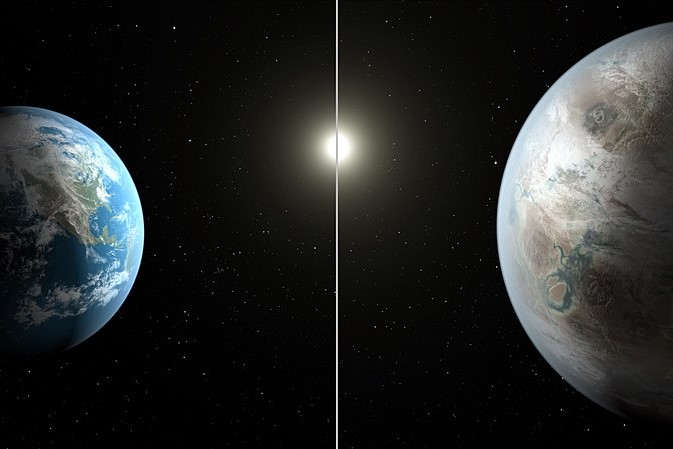Our planet Earth, Gaia in Greek, considered as a living being, regularly corresponds with another planet in the universe, Aurora Kepler 452 B in the constellation of the Swan. Gilles Voydeville makes us discover this magnificent interstellar correspondence.

Letter of August 2021 on Gaia
Letter from the scorched earth on Kepler
My dear Gaia
I have just read you and learned so much that I am still amazed. So much has happened in your home, so unexpectedly and surprisingly, that I feel as if you are writing a novel rather than reporting the facts of life on your land. Your little virus is truly an ace of transformation, a contortionist of infiltration, an illusionist who feigns the highly elaborate systems of your Charming’s defenses. It allows you to support him by reminding him who is the master.
Peace cannot last forever
I too on Kepler, my land, must live with my creatures. I have the advantage of not having the problem of food to solve. My species that feed on others, I tend to banish them. But if I created them so that they don’t fear each other, that’s not why they love each other. In truth they tolerate each other more than they love each other. As the medorchats’ attacks on the pouloids revealed, peace cannot last forever between two races. A bit like your dogs loving your cats!!! There will always be a struggle between all these creatures to cover a territory, subjugate another or be loved by the dominant race which in my home is the Ovoids, and a cash cow, the pouloid. In your case, the food chain includes the exploitation but above all the devouring of one by the other.
The roads to so-called bliss
Your Charming practices both but few of your species exploit another if not your ants that train your aphids to collect their honeydew and feast on it. In exchange, they clean them of their exuviae and excrement, thus avoiding the development of toxic fungi. The ants protect their livestock from your ladybugs and hoverfly larvae, which love your aphids for their tender flesh, not their feces. And if the sap runs out on the leaves of plants sucked to the marrow by your gluttonous aphids, your ants carry them to other branches. Convoys of logistic ants loaded with livestock are formed on the roads of the so-called bliss.
Your ants thus share with your Charming, the exploitation of the species for their production and not only for their flesh. But they can eat the aphids that do not produce honeydew, just as your Charmings devour the oxen and exploit your cows.
So here on Kepler, in general, life under my Ovoids is quiet. It is based on the total exploitation of my pouloids, who do not have the means to revolt and give their milk without compensation. They are the slaves of the system. But their slavery is limited to automatic and painless tasks. They graze, chew, digest and produce delicious milk without pain or fear. They rule over green carpets where you need only stretch a plump neck to taste the meadow grass, the beautiful grass of the northern regions of my globe; or the perennial rye grass that rises up under their hooves as quickly as it was trodden on; or the fine fescue that regales them in the shade of the hillsides; or the tall fescue that regenerates as soon as it is grazed; the zoysia that they meet when they gallop on forbidden parks reserved for walking with balls of my Ovoids; the bermuda grass that likes the heat and sleeps in winter like a Rocky Mountain bear; the oxcart with a wide, hard, robust and muscular body that endures drought and sand; the eremochloa ophiuroides that they like less because it is short and resists their jaws.
Ah, what a beautiful harmony to have found a slave whose work does not make him suffer! For his digestion is painless, except when he swallows prairie snakes, a kind of small snake…
What a hard life they have! All they have to do is open their mouths and brood. Your Charmings do the opposite…
The absence of struggle for food allows peace to reign between the ovoid peoples. If my pastures are threatened, as you probably remember, it is me who intervenes. I have already generated a dormant grass to give my soils time to regenerate before they are totally depleted.
The Big Five and their razzia
Here, the wild life, the one that my Ovoids neither dominate nor exploit, is a bit rougher. Remember the Big Five and their raids. With their winged firepower, this species destroyed everything to satisfy their gluttony. They attacked my entire nature and its delicate inhabitants. From my Ovoids they made omelettes, from my meadows burnt stubble and from my forests strings of trunks blackened by their red iron breath. It was no longer a question of whether it could continue, but how long the diversity would resist these hellish dragons.
There too, I regulated…
You probably remember, with little papillomaviruses. They were responsible for infesting the larvae of the Big Five, those huge caterpillars that snaked through my meadows before giving birth to the monsters. I had understood that these caterpillars loved the smell of rotting fish and animal buttocks. So I infested my mosses and berries with my odorous papilloma virus. As the berries stank a hundred miles away, the larvae had no trouble locating them and feasted on them like your monks on a cheese feast. And when the larvae metamorphosed from their chrysalises into these avian behemoths, they burned their cocoons which, under the fire of their incandescent saliva, were consumed while exhaling a delicate aroma of rotten flesh and chevroid crotch.
The first crash of a Big Five
For a while, the Big Five fueled their muscles with egg-shaped flesh and their fire pumps with bituminous naphtha. But after a few high flights worthy of their ancestors, they began to flap their wings a bit limply. The loops of their huge ribbed wings were no longer as amazing or precise. The dives became less sharp. Straightening out their trajectories was technically problematic, and inappropriate brushes with obstacles became more frequent, as did uncontrolled flights on their backs. The jet of their burning plasma became less powerful and it was difficult for them to coagulate and swallow in the process.
And I still remember the delightful bang that told me about the first Big Five crash: the papilloma had succeeded and Kepler was soon rid of those winged blowtorches.
One down, ten to go and soon a thousand to go.
My dear Gaia, I am changing my mind: apart from this emergency case which, under penalty of seeing a desert established, required an intervention on my part, I wonder if it would not be more judicious to have species that devour each other rather than exploit each other.
Let me explain: when one of your carnivorous fish devours a smaller one that had swallowed the plankton, the carnivorous one spares the deprived being that is the plankton. Whereas your ants, by exploiting your aphids, enslave your plants which end up dying from having been deprived of their sap.
Cunning beasts
Our carnivores allow us to have fewer mouths to feed and above all they are the only ones that allow us to spare our defenseless vegetation: the flowers of the fields, the grasses of the meadows and those of the marine areas: the pelagos that circulate in the open water and the benthos that cover our bottoms.
As you know, I keep an eye on my Transparents, which are cunning beasts, and until now, I would have tended to resent them for piercing incognito the udders of the pouloids and the hulls of the Ovoids. But in the light of my new reasoning, I should probably let them multiply and swarm to spare my plant world a little more…
Ah, my dear Gaia, how difficult it is to regulate a planet!
It’s a good thing we correspond. Otherwise I would be remarkably lonely and I would say increasingly lonely. My scientists at ICL have just proven to me how much more lonely I am. Our Universe being in expansion, we are getting further away from each other every day. Oh sure, this is very relative considering the already existing distance. But they have calculated the speed of our distance: 67.28+- 0.61 kilometers per second per megaparsec (one megaparsec corresponds to 3.26 million light years). As we are 1400 light-years away, this is still about 30,000 kilometers per second…
Space is a bit curved
Since with another system of perception using the parallel between the distance and the perception of the observed object in red (identical to your Dopler effect), other scientists have found differences in distance of the order of 10%, the scientific world is questioning the initial theories. The ICL is now thinking of introducing other particles than the dark energy present in empty space. In the theory of your Einstein, it counteracted gravity to explain the expansion of the universe. The theory of flat space of the Euclidean type (the sum of the angles of a triangle is 180°) also seems to be questioned. Some people think that space is a bit curved. If memory serves, the more curved it is, the more likely we are to pass through a wormhole that would bring us closer. So I adhere to this last theory.
Finally, nothing is sure. It is the great principle of fundamental research. After having acquired new and more powerful instruments, scientists realize the inconsistencies of their previous theory and they come up with another one. This one lasts in general until the appearance of other instruments, even more powerful, which demonstrate the insufficiency of the new theoretical model which must itself leave the place to a following one. Even theories tremble for their lives.
35 million galaxies
The last instruments, I don’t know if you have them, are multiple fiber spectrographs connected to telescopes. The variations towards the red of the perception of the galaxies observed by these instruments will be able to give us a cartography of the sky in expansion: 35 million galaxies will be listed. We will have the map, we will only need the adequate means of circulation…
Ah, it’s all very exciting, but I’m exhausted by it all!
Like you, I will rest while contemplating my landscapes. To see my streams of amaranth swarming between the clumps of asphodel. To listen to my mother-of-pearl torrents running down the quartz gorges. To watch my wading birds with amphora beaks fishing on my ponds covered with water lilies. To admire my clouds of incense covering the mephitic vapors of the sulfurous volcanoes… How beautiful is my nature! How pure my air is like a cosmic ray! How clear my water is like a nymph’s tear ! How immense is my love !!!
Your Dawn

